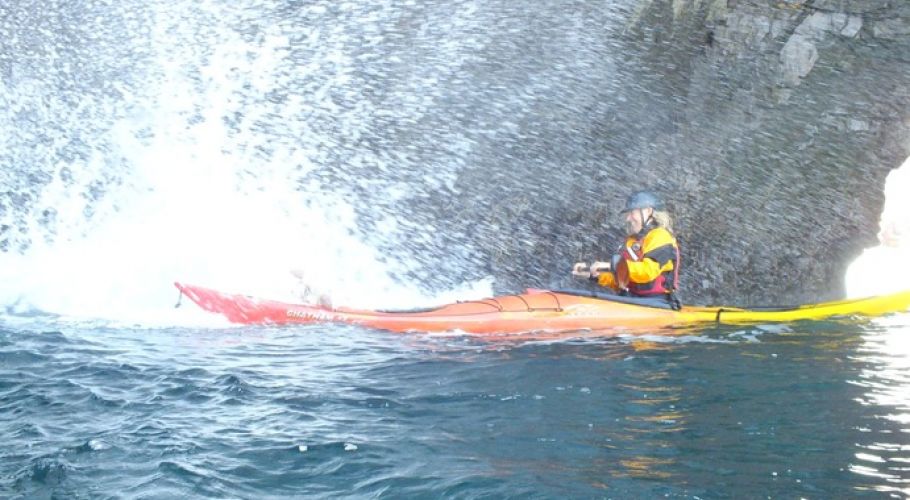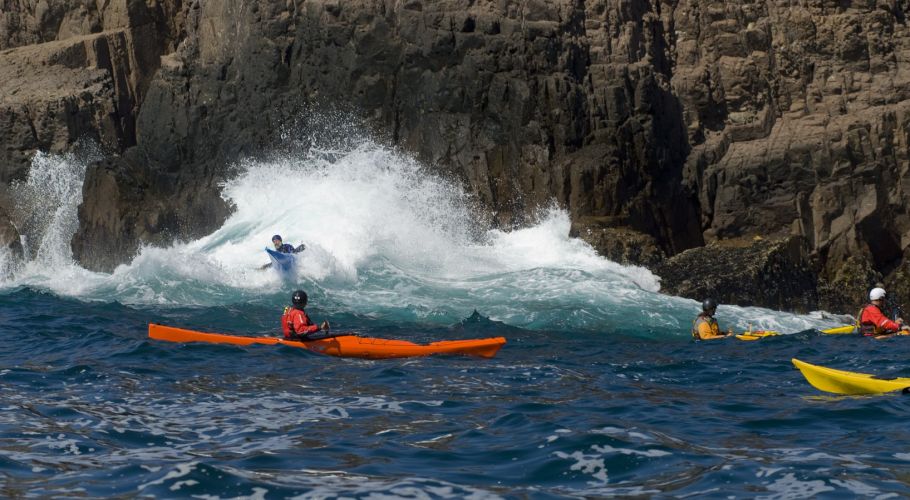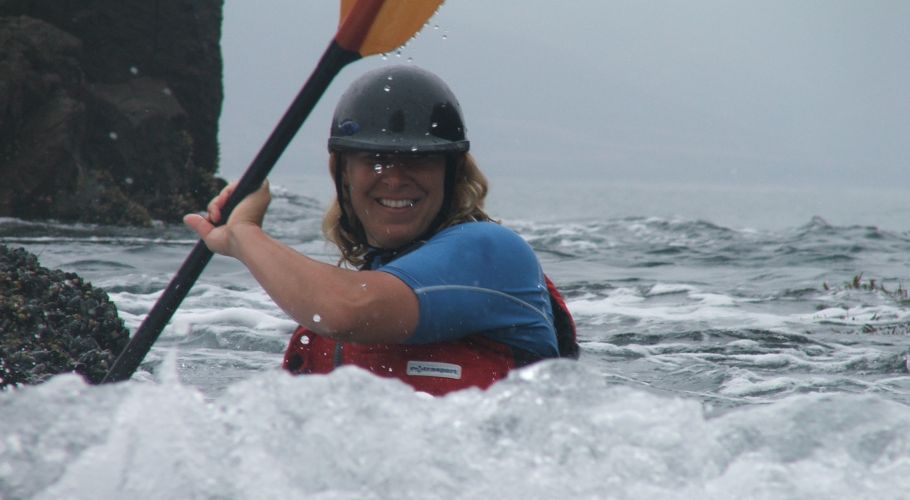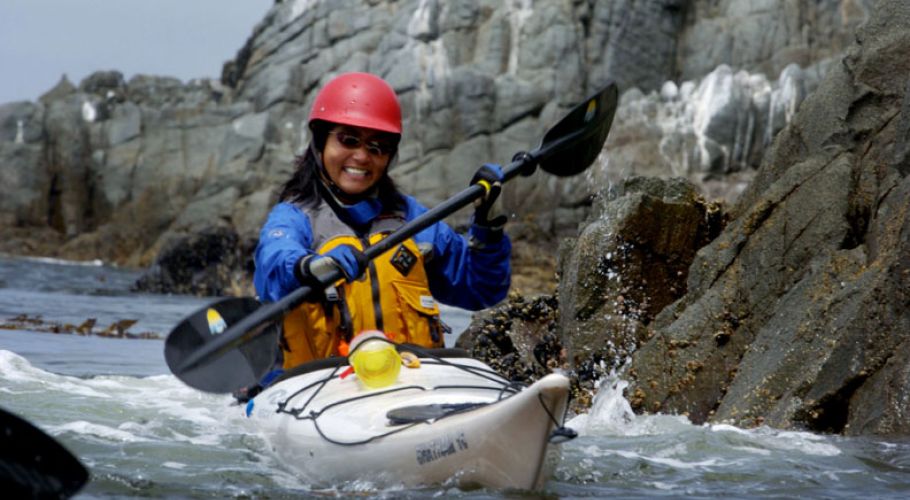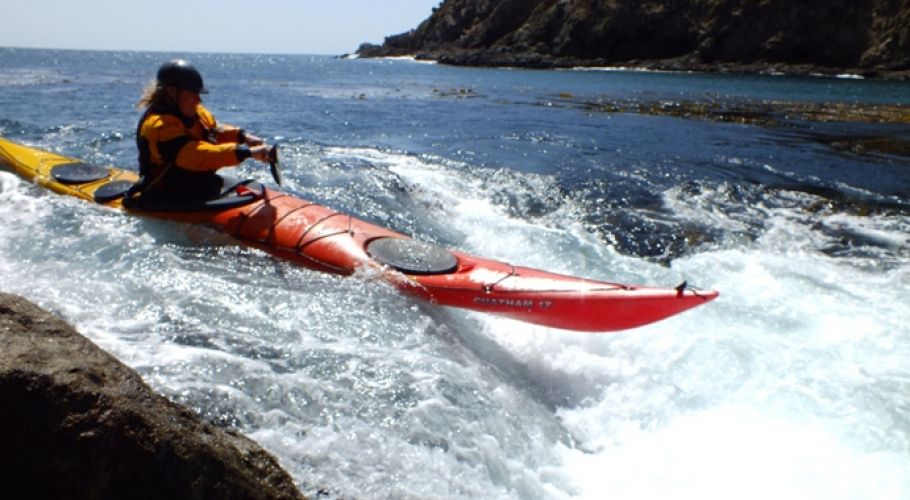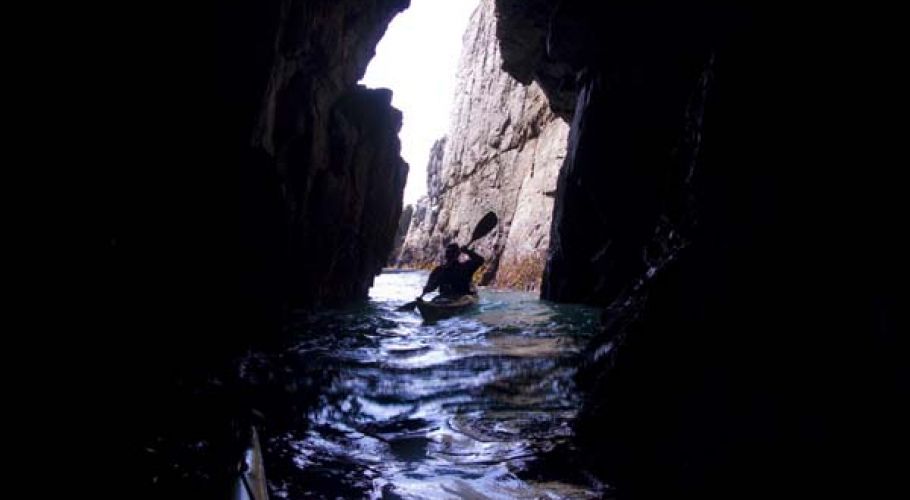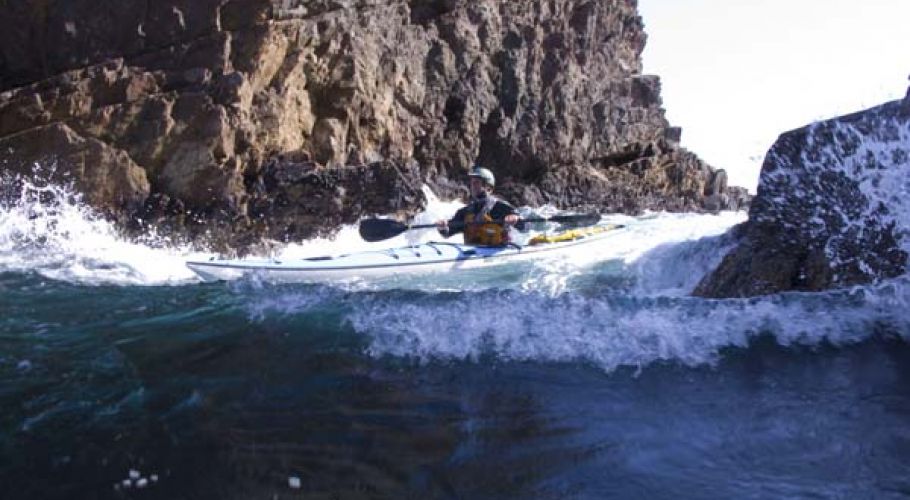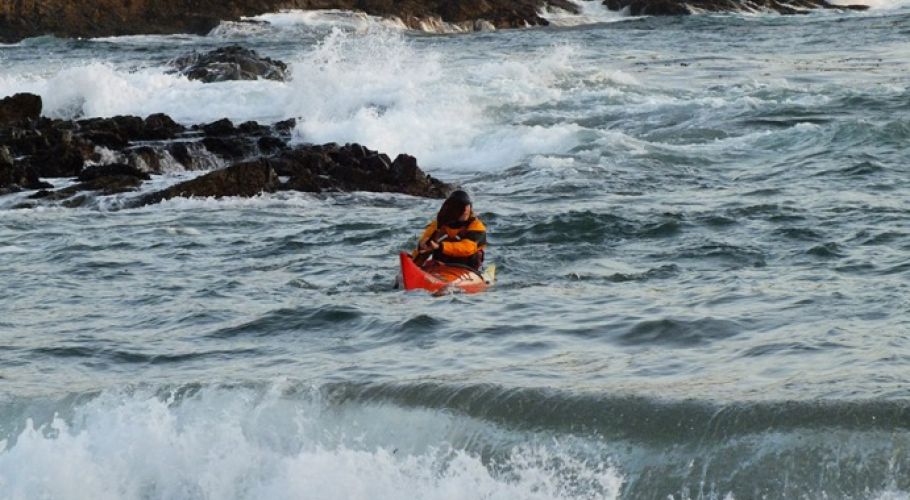Courses are most satisfying for participants when they stretch your comfort zone just the right amount. This is easiest to accomplish for a group when all members share roughly the same skill level. Self evaluation can be very difficult, but please have a look at the following descriptions and give us an idea of where you fit. Your self-assessment doesn't commit you to any group - a primary job of the coaches is to: 1) establish suitable groups and 2) ensure that every participant in their group is suitably challenged. Please let your coach know on any given day if you'd like to be challenged more or less. The great thing about this area is that different skill levels can be accommodated in the same group. The most aggressive paddlers can work with the biggest swells in a set, or the biggest, most challenging part of a feature, while less experienced paddlers can work with the smaller swells and easier parts of features. If you're not getting what you want, please talk to your coach!
Level 1: These participants can perform a variety of techniques to control their kayak including sweeps, draws, and rudders. They can edge and brace in small waves and have practiced assisted rescues within the last 9 months. Rock gardens may be an entirely new environment. They may not be able to roll, but are probably working on it. They can paddle 6-10 miles in a day. The focus of courses at this level will be in learning to read the water and understand the rock garden environment, perform accurate risk assessments for any feature, and to fill in any gaps in technical proficiency needed to negotiate simple, low-consequence rock garden features.
Level 2: These paddlers have some experience in rock gardens and are looking to increase their ability to read features and develop precision control for more challenging manuevers and features. They can probably roll, but not always in "combat" conditions. They perform assisted rescues quickly and efficiently in bumpy water. They can paddle 10-15 miles in a day at a good pace. The focus of courses at this level will be on refining water-reading and risk assessment skills with an aim to promoting confident judgement and independence from coaches.
Level 3: These paddlers have significant experience in surf over 3 feet, rock gardens, and/or class 3/4 whitewater. They will have a pretty reliable "combat" roll (but we are ALL just between swims), and can perform assisted rescues quickly in rough water and under pressure. They always wear tow lines and know how to use them. They have the skills and judgment to tackle big, technical moves and understand the consequences of bad timing, or mis-reading water. These groups will be working as coherent teams with every member contributing to safety, while being thoroughly challenged.
Conditions are always perfect! It's just a matter of determining what they are perfect for. Because we can't reliably predict conditions very far in advance, please be prepared to be flexible. On the other hand, because group sizes are kept small, it is easy to adapt on the fly to meet the desires of everyone. It's more important that we know what TYPE of courses you're interested in.....for example, rock garden play? incident management and rescues? leadership training? than in planning an exact schedule in advance. Some participants will want to develop their boat control skills and water reading ability by playing in the rocks as much as possible. Others will want to focus on technical skill development like towing, rescues, effective strokes, etc. The more clear you are about what you want to get out of this event, the easier it will be for us to provide that experience!
A beautiful sandy beach near Festival headquarters sometimes has gentle surf prefect for mastering the art of surfing sea kayaks. A nearby point break may offer more advanced challenges for experienced group members if conditions permit. Swell size and direction need to be right for these breaks to be working. We can never guaratee it!
Part of developing and improving your personal skills includes understanding where your skills are. We love the British Canoeing scheme for guiding our development and are happy to show you how it can guide your own development.
Please visit www.britishcanoeingawarding.org.uk to learn more about the scheme, and visit https://www.britishcanoeingawarding.org.uk/personal-performance-award-resources/ to learn about the sea kayaking personal performance awards.
There is no need to register for a formal assessment. Simply let us know if you are interested in knowing where you stand in relation to those standards.
We aim to learn by doing in these groups! You'll learn how to select appropriate play spots, how to organize the group for safety, how to risk assess a rock garden play feature, and how to read the water for maximum fun and safety. Your boat control skills should already be pretty good (and should match the level you choose - see below), so these classes will be more about getting the timing right and using the water to your advantage. Your coaches will tweak your technical skills, but you should have a range of effective paddling techniques already available to you. Participants will be divided into small groups based on skill level (see below). Please note that we reserve the right to re-group participants based on coach feedback.
These courses will be "park and play" type courses. You may not travel more than a couple of miles all day, depending on what features you find! Please note that a paddler's development from one level to the next happens on the scale of months (or years), and not days. It is not appropriate to take Level 1 on one day and Level 2 on the next. That said, coaches and participants will work together to create groups that are well matched and may reconsider groups each day.
Level 1: These participants are solid sea kayakers, but pretty new to rock gardens. We'll start with small features to develop water-reading skills and confidence and work our way up to bigger features. The great thing about rock gardening is that you can 'sit-out' anything you don't like the looks of! Participants will have more fun if they have a roll, but it's not required.
Level 2: These participants have done a bit of rock gardening and are looking to up their game. We'll seek out a wide variety of features of varying sizes to gain experience and confidence. These participants should have a relatively reliable roll.
Level 3: This is the "go big or go home" crowd looking for the biggest, most thrilling rides they can find. By "thrilling", we don't necessarily mean "dangerous", although some of the features this group chooses may have a higher risk factor. In order to control that risk, the skill level of this group needs to be higher too! Participants are expected to stay within their own personal risk tolerance levels and sit-out any feature they don't feel up to. Participants should have a fair amount of experience in rock gardens and the ability to risk assess a feature for themselves. If the gang starts to get too crazy for your tastes, there's always another feature near-by! As far as rolling goes, we're all between swims, but if you join this crowd, chances are the last time you swam, you got sucked out of the boat.
This course will be full of fun rock garden play, but as part of a journey that will cover 6-10 miles. As long as conditions permit, each day will involve a different route with a different coach. We'll linger a bit at the best play spots, but in general, we'll be working our way along the coast through the slots and caves and striving to see as much of this incredible coastline as we can!
Unless there is sufficient demand, we won't be dividing these participants by skill level. Instead, each participant can choose which of the features to enjoy and which to paddle around! All participants should be comfortable in 3' breaking waves, swell, chop and clapotis, should be comfortable performing assisted rescues in bumpy water, and should be familiar with towing.
For those who are interested in leading kayakers into adventurous ocean conditions! A good leader can assess the skill and confidence of their group members, can assess their environment, can choose suitable environments for their group, and is well prepared to contend with any mishaps or incidents quickly and efficiently.
This course will include a little of everything: rock garden play, journey, incident management, and leadership skills!
We will largely follow the syllabus of British Canoeing Sea Kayak Leader award, but it is NOT only for those interested in obtaining certification. This BC document will give you more details about the certification standards if that is your goal. Participants who want to register this as an "official" BC Sea Kayak Leader Training, must have taken the BC "Coastal Navigation & Tidal Planning" Course.
Topics will focus on assessment skills (of both group members and conditions), and incident management/rescues in rock garden and wind. Participants should be at ease in winds of 16-20 knots and breaking waves up to 3' and should be able to roll most of the time in flat water.
We'll look at incident management techniques in a rock garden environment. We'll focus on setting up safety at a variety of play features and practice techniques to prevent a small incident from becoming a big one! This course will look at slots, caves, pour-overs, breaking waves... ...pretty much any feature we can find! Participants will spend a lot of time in the water, so drysuits are recommended, and if not a drysuit, then a good wetsuit is mandatory. All participants should own a tow line (bring it!) and be familiar with basic towing skills. Participants should be comfortable in 15 knots of wind, 3' breaking waves, and lumpy water. A roll is not necessary.
"Incidents" are likely to include: capsizes in a variety of interesting places, broken boats and equipment, injured paddlers, hypothermia and other illnesses. Participants are asked to bring (if possible) whatever safety gear they normally carry to deal with such incidents.





